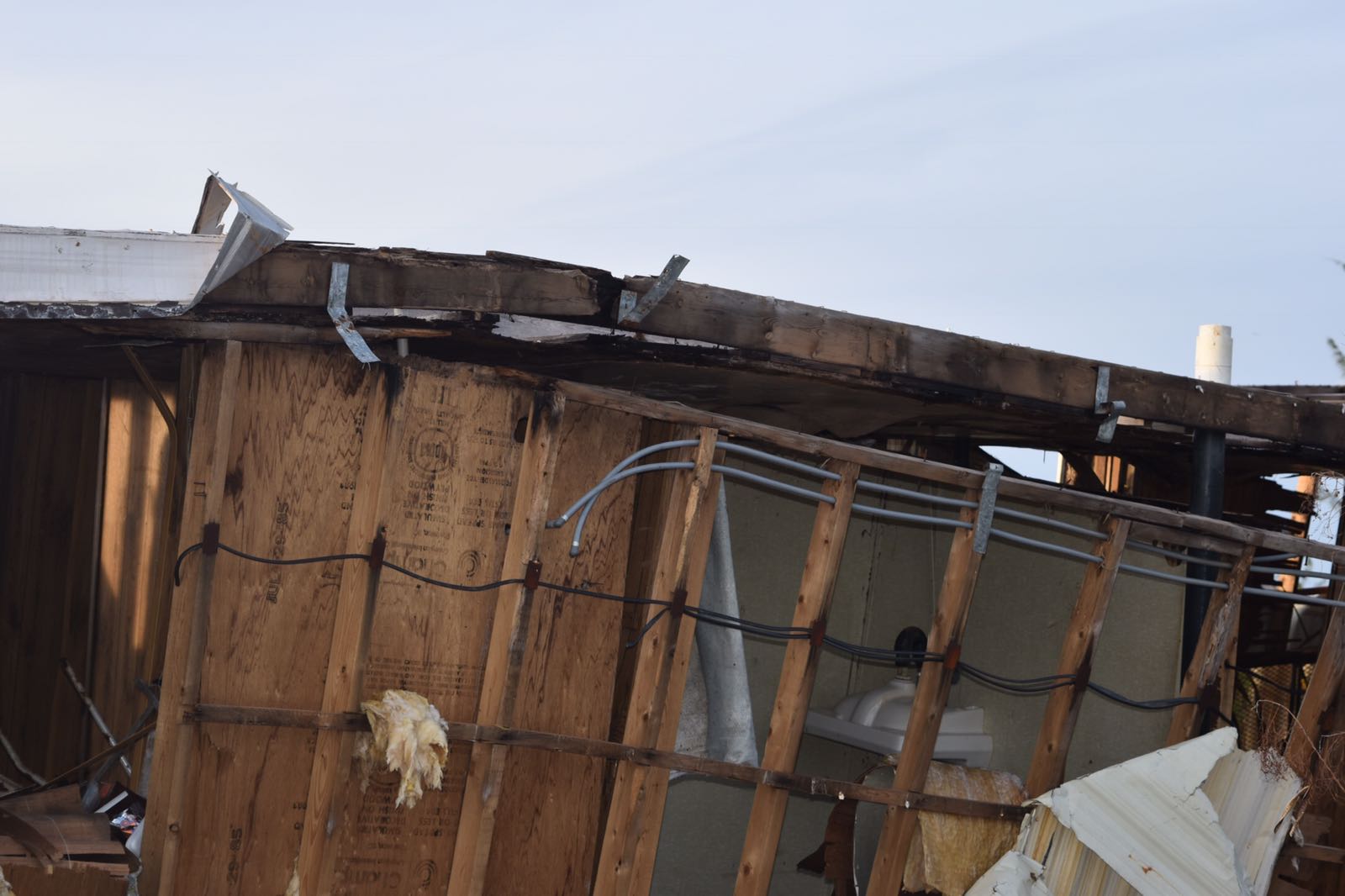
By Dr Ian Bethell-Bennett.
A few weeks ago, this question was asked in a column that focused on the death of legendary artist Sam Shepard. Today, I ask this question again in the wake of Hurricane Irma’s devastation to the map of Bahamianness and Caribbeanness. As a people who survived the reality and the legacy of slavery and resettlement, we do not take time to process our grief. We do not sit and ponder! We do not have time. Our lives are so often predetermined by external forces that are both visible and invisible to the eye that we are always moving. What has occurred over the last two weeks is mostly invisible, aside from the obvious and daunting structural and spatial devastation we see on the surface.
Without hardly missing a beat, people are ready to throw the physical place/space onto the trash-heap of history. Once the physical is removed—and so markers of memory and identity are absented from the world—we lose a sense of self and connection. During Slavery, the imperial project sought to keep different groups of peoples apart to minimise the possibility of enslaved bodies being able to form too deep and fast bonds that would threaten the deracination and dehumanisation process. Today, the corporate raiders from the history of the East India Company, to the United Fruit Company and the Post-Iraq situation—where there is an attempt to redesign of one of the oldest places in our world—all speak to a management of space and a brutal use of natural disaster, as in the case of Hurricane Katrina in New Orleans, to ‘rid’ the map of the unsightly. Naomi Klein, Anderson Cooper and William Dalrymple are only a few who explore this re-mapping and removal of people from spaces that are then rezoned for higher capital gain. We are not only removed; we are absented or left to perish under devastation. What does it mean to be absented? I would have to reconsider the eradication of spaces/places that Edward Said discusses in “Out of Place,” (1999) and “The Question of Palestine” (1979( or the reality of the depopulation of Diego Garcia by the UK government for the sake of creating a US base, the greater good!
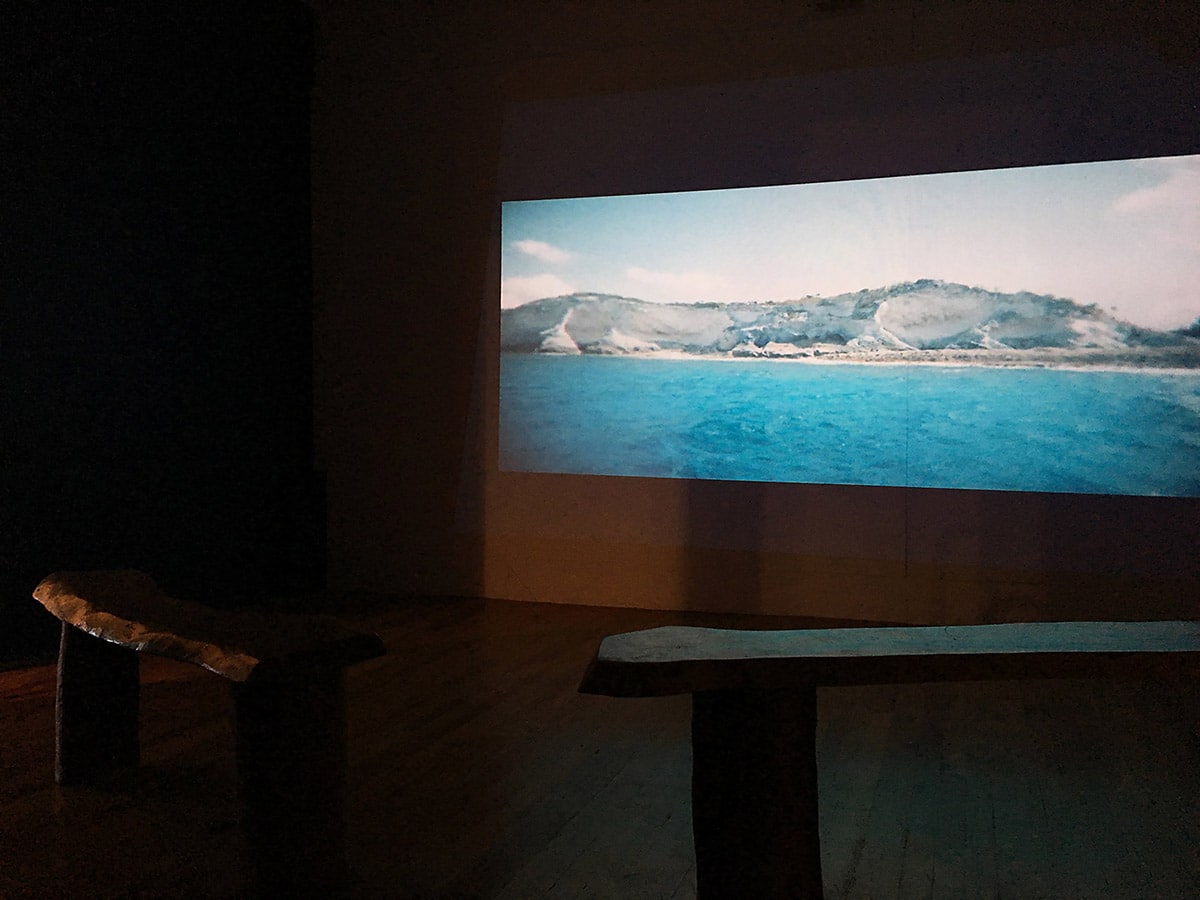
Film still from “The Domestic Tourist” featuring Noelle Nicolls, part of the series of short documentaries “Those From Shallow Waters” highlighting our everyday Bahamian stars, a Settlers Cove Productions film. Currently on display in the Project Space of the NAGB.
Physical remapping.
In art, the power of the brush, palette knife, or razor blade under the eye’s guidance can change the way we see and so represent a subject. As much as a border, wall, fence, or a river can be created, carved through a homeland to create two new separate and dehistoricized spaces. The Naturalist or Romantic movements could arguably be charged with creatingthings that did not really exist as they were depicted, but that is the value of art and it is also the value, or the potential, of art to be able to ‘return’ to the place/space of the romantic past and to reconstruct that space as it had been imagined into being. We can begin with works of fantasy that create spaces like Nirvana, “Xanadu” already a famous work in its right, or “Utopia” (1516) by Thomas More that could all work with psychedelic work of imagination or work by Alfred, Lord Tennyson’s“The Lotos-Eaters” (1832).
We only need look to Greek art of bygone years to see images of lotus eaters. But our art is more real, our danger more intense, and our project seemingly less important, less visible, and less poignant to many.
As the waves receded from Irma’s fury, a breath that blasted island and rock with merciless wrath, we heard voices, much like those goblins in Rossetti’s poem “Goblin Market” (1862) who tempt mortal women to eat their good fruit and once they succumb to the temptation, they are never to have the pleasure of eating such succulent fruit again. The Lotus eaters or goblins are the ones who articulate and propose a message of ending life on islands in favour of coming to a crime-ridden, over-populated, mal-constructed and designed capital island.
As Ragged Islanders sat up and—through their grief, though we talk not about it, through their trauma, though we ignore it, through their loss, though we partially acknowledge its transient nature—stood fast and refused to be moved. Why would it be okay to give up home and hearth to the vagaries of natural disaster Irma, a wrathful and arguably vengeful tempest which will not soon be forgotten? As pundits offered sage advice for the Islanders, though we all suffer collectively the reality of being in nature’s way, we have chosen the myopic view of becoming witnesses of global change and accepting the outcome without resisting the passage of water over our heads, sand around our eyes and branches through our souls. They refused to be moved. Their determination led to the leader of government taking their side and declaring that Ragged Island would be the first Green Island in the Commonwealth of The Bahamas, (a term that has little resonance in this day and age and to youth that sees no common wealth).
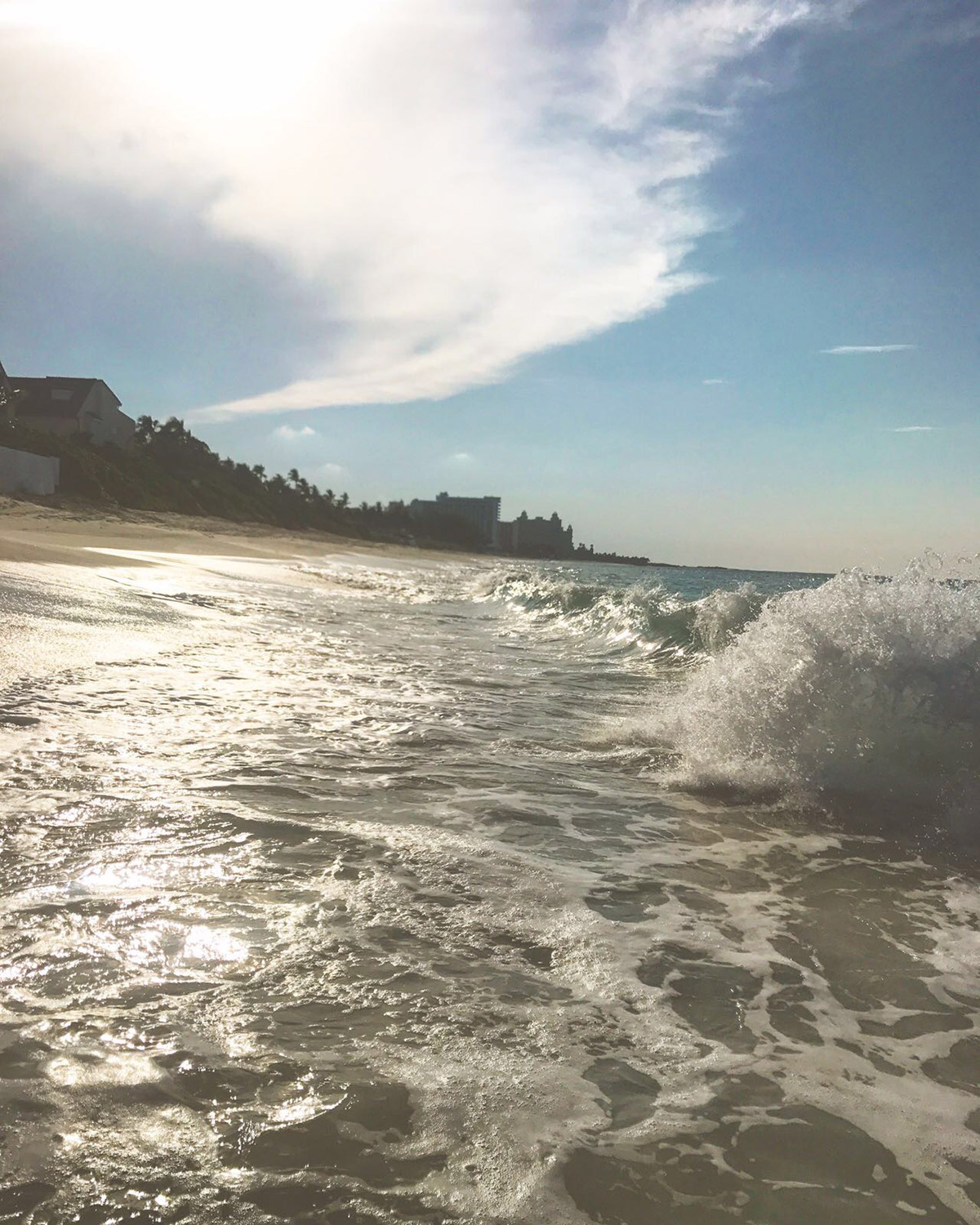
Cabbage beach Post-Irma, before the arrival of Hurricane Maria. Image by Steven Cartwright.
This is a mammoth task, and it will be, like an epic, long fights and a journey with cliffs and valleys, challenges and foes, demons and assailants, but as with any epic, should the Ragged Islander stay the path, they are promised success, though it come years, decades or eons later. Sadly, the government must do all of this, at least to the point of livability and survivability, before hurricane season starts again in June 2018. However, the goblin men who willingly and gleefully flog their brothers’ and sisters’ in an open market only bring to mind what Rossetti writes:
“No,” said Lizzie, “No, no, no;
Their offers should not charm us,
Their evil gifts would harm us.”
Bahamians—like Barbudans and Antiguans, Anguillans and BV Islanders, people from the Turks and Caicos Islands—have suffered slings and arrows of outrageous fortune for centuries, and many have managed to survive, yet we receive a hurricane and all bets are off. We should understand the tumultuous and shifting face of the tropics and see the image that excludes us from its colonialist fashioning.
Were New Providence to receive the wrath of Irma-force winds blasting overheated waters and bringing cooling waves, would we dislocate? Do we ask for West End to be removed and replaced by a new island style somewhere? If an entire people moved, are they still a nation? Do they still retain an identity? Do they still have access to a collective memory, voice and image of themselves? The problem with Thomas More’s Island of Utopia, for example, is that it becomes a state that is happy to degrade those with whom it sees itself in opposition. We tend to see only our vision of life.
The view of beauty is always relative, and one’s home will never be as agreeable to anyone else as it is to its dweller. When West End is devastated by each hurricane’s fury, by the shifting desires of a governing body that has no responsibility for or accountability to it, though it ‘owns’ the lion-share of the productive island, it should seem that we are under threat.
“In Xanadu did Kubla Khan
A stately pleasure-dome decree:
Where Alph, the sacred river, ran
Through caverns measureless to man
Down to a sunless sea.”
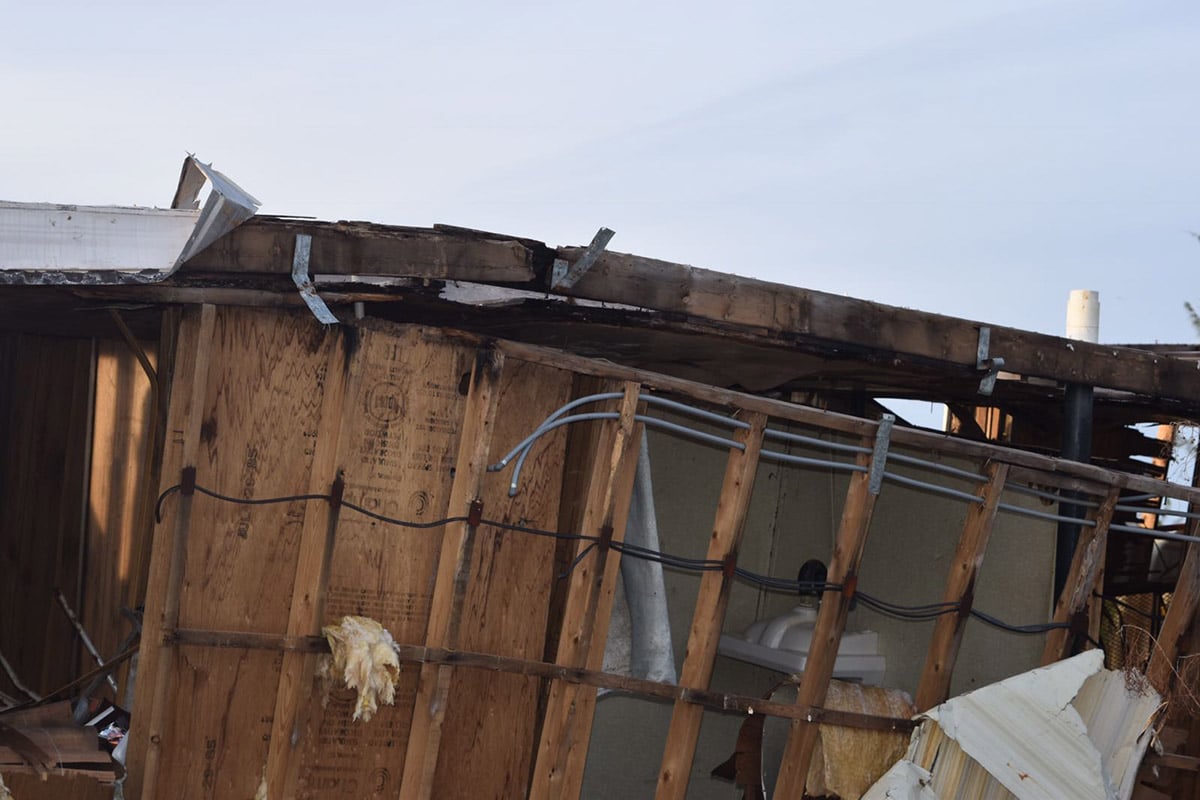
Post-Matthew devastation. Images by Dr Ian Bethell-Bennett.
Our sea lavishes it’s reflective and refractive beauty on all around and in its natural fury when not at ease is as beguiling as its placidity. When we examine the obvious re-scaping, what occurs when we no longer have a state to occupy as a people? When our nation forward moves, out of the caverns of hotly beautiful paradise, we become a people without a state, a stateless ‘nation,’ who are subject to the whims and fancies of those who shelter us. Why move a nation into another man’s state?
“His flashing eyes, his floating hair!
Weave a circle round him thrice,
And close your eyes with holy dread,
For he on honey-dew hath fed
And drunk the milk of Paradise.”
“Kubla Khan or Or, a vision in a dream. A Fragment,” by Samuel Taylor Coleridge. (1816)
Why not weather the misfortunes and learn from our past, much like the Maldives or any other Small Island Developing State under the threat of climatic change and distant political interference though economic occupation? Why must we surrender now? Are we quick to think that we would receive better treatment than the boat people, the refugees, the migrants, the immigrants who cross heavily pregnant into the promised-land to find a hell of a paradise, where laws are used to exile them back to lands they have never known?
Are we so quick to use the colonial remapping of tropical spaces of alterity yet abundant productivity for those masters of feudalism that saw the world as a map to their success?
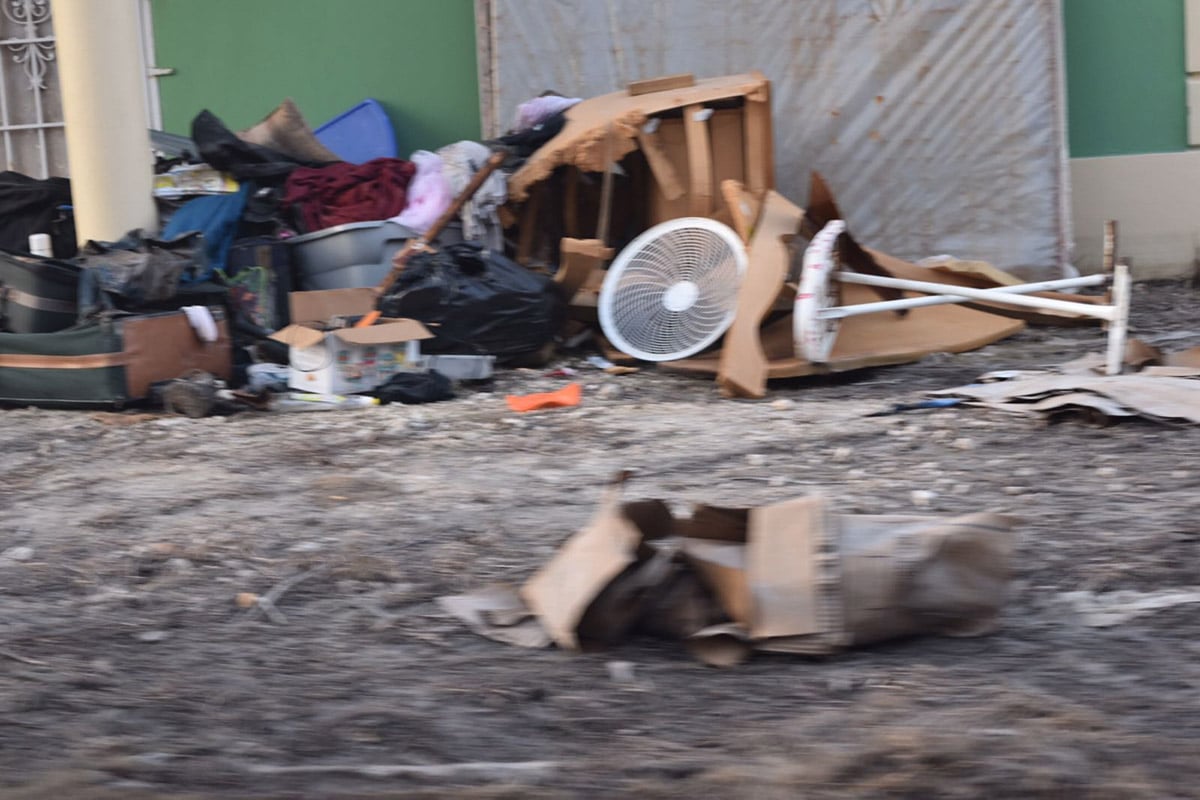
Post-Matthew devastation. Images by Dr Ian Bethell-Bennett.
We understand the desire to want stability, but that comes at the price of using green and sustainable technology to construct new and more resilient and resistant homes behind seawalls and barriers that live in relative harmony with a cataclysmic sea. Our collective memory, foodways, cultural ethos and our stories of survival are under threat through depopulation and to wish this, as good-intentioned as it may be, is to argue in favour of the return of imperial paradises where offshore sanctuaries provide the revenue for European development.
It is easy to discard land that we may see as useless, but before the land is evacuated properly, the speculators—much like those goblin men—arrive, survey instruments in hand, ready to carve the new paradise and to gate the new entrances built behind and beyond a once small, idyllic space abandoned by those who saw truth in the prophecies of global climate change, but did nothing to ready themselves to face the new reality prepared and forearmed.
Should an entire population move, we cease to be a nation. The memory of the state will vanish and, with it, the stories of us, the national discourse that brought us here to where we are in the 21st century. If an entire nation of people moves then they are no longer a nation but a diaspora of somewhere, now forgotten, adrift on a sea of exiled realities and immigrant challenges. We will become those we currently look down our noses at. It is not about these islands being uninhabitable, but rather about them being dangerous and surrounded by a tempestuous sea and a colonising, imperial gaze that much like Irma’s eye can exact a great vengeance.
History has served as a witness to the corporate takeover of useless land and the re-mapping, re-imaging of that land for wealthy walls and investment. Much like the representation of enslaved blacks in the Caribbean as gentle, peaceful and passive, we know the other side to that story, and that indomitable nature that has brought us to this point in the 21st century, why give it up now?